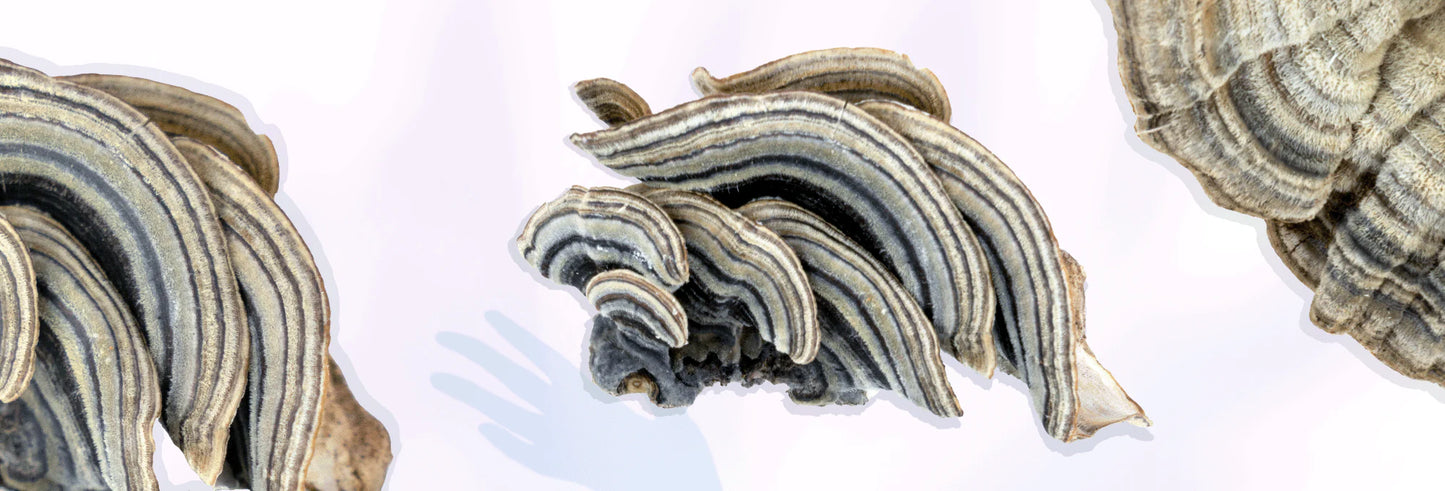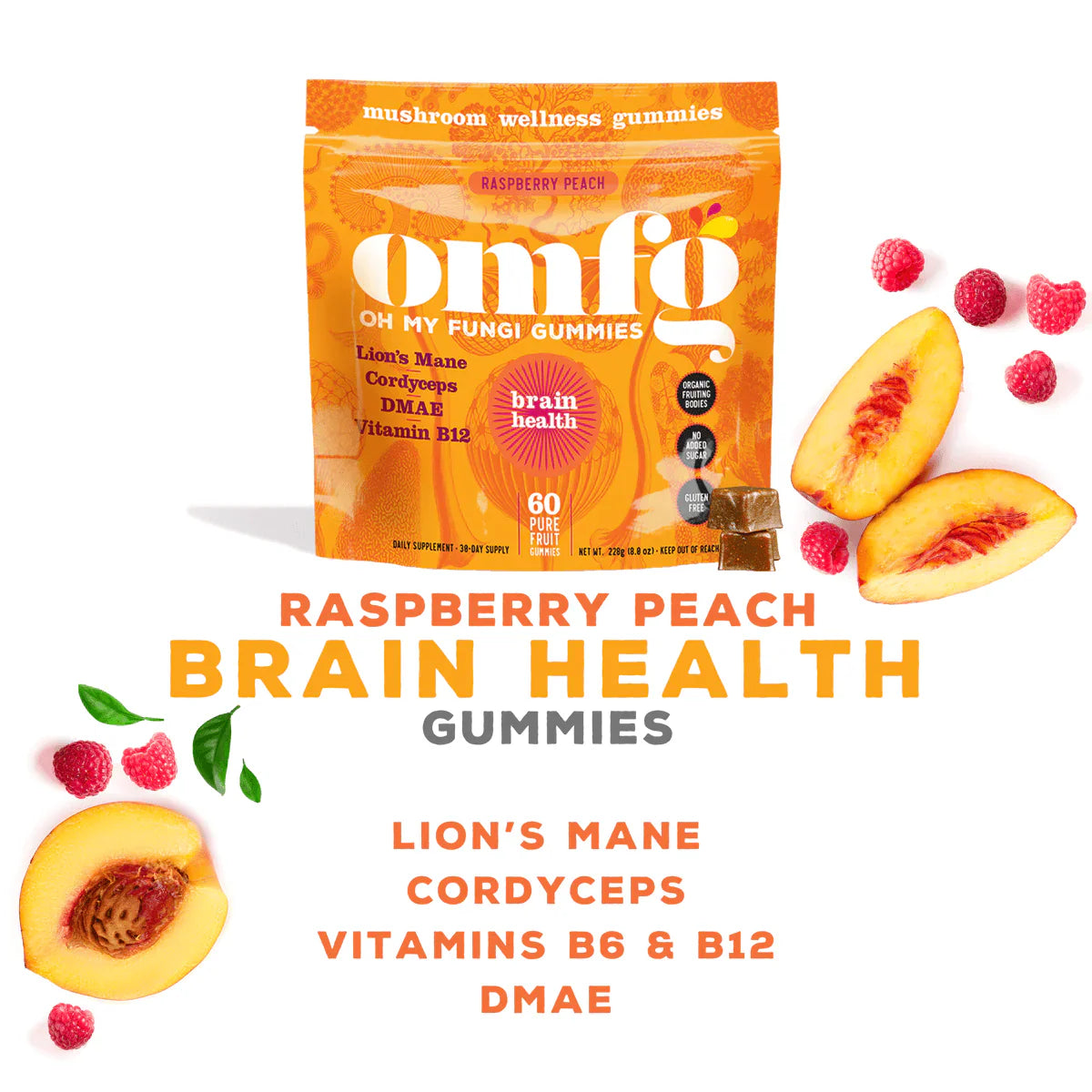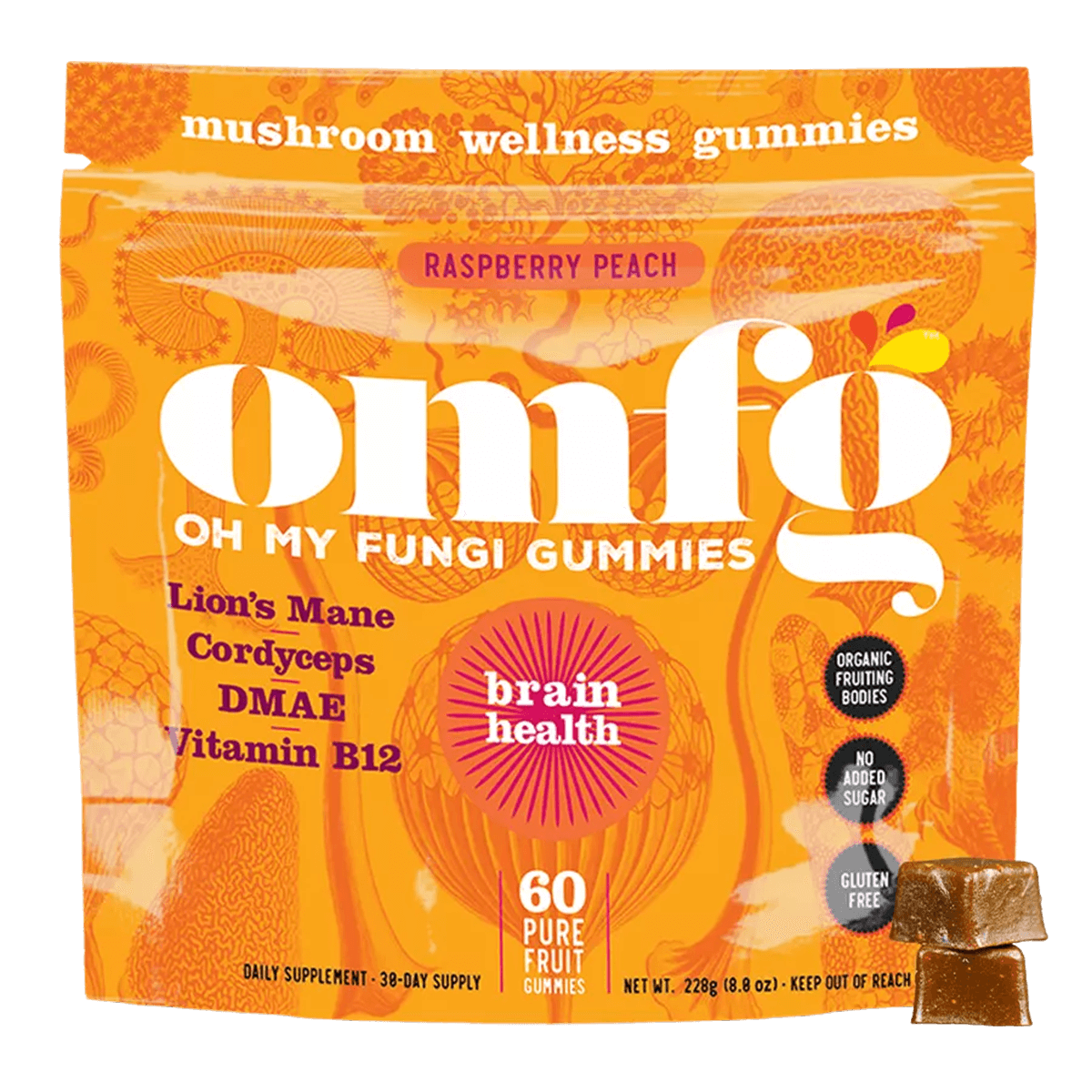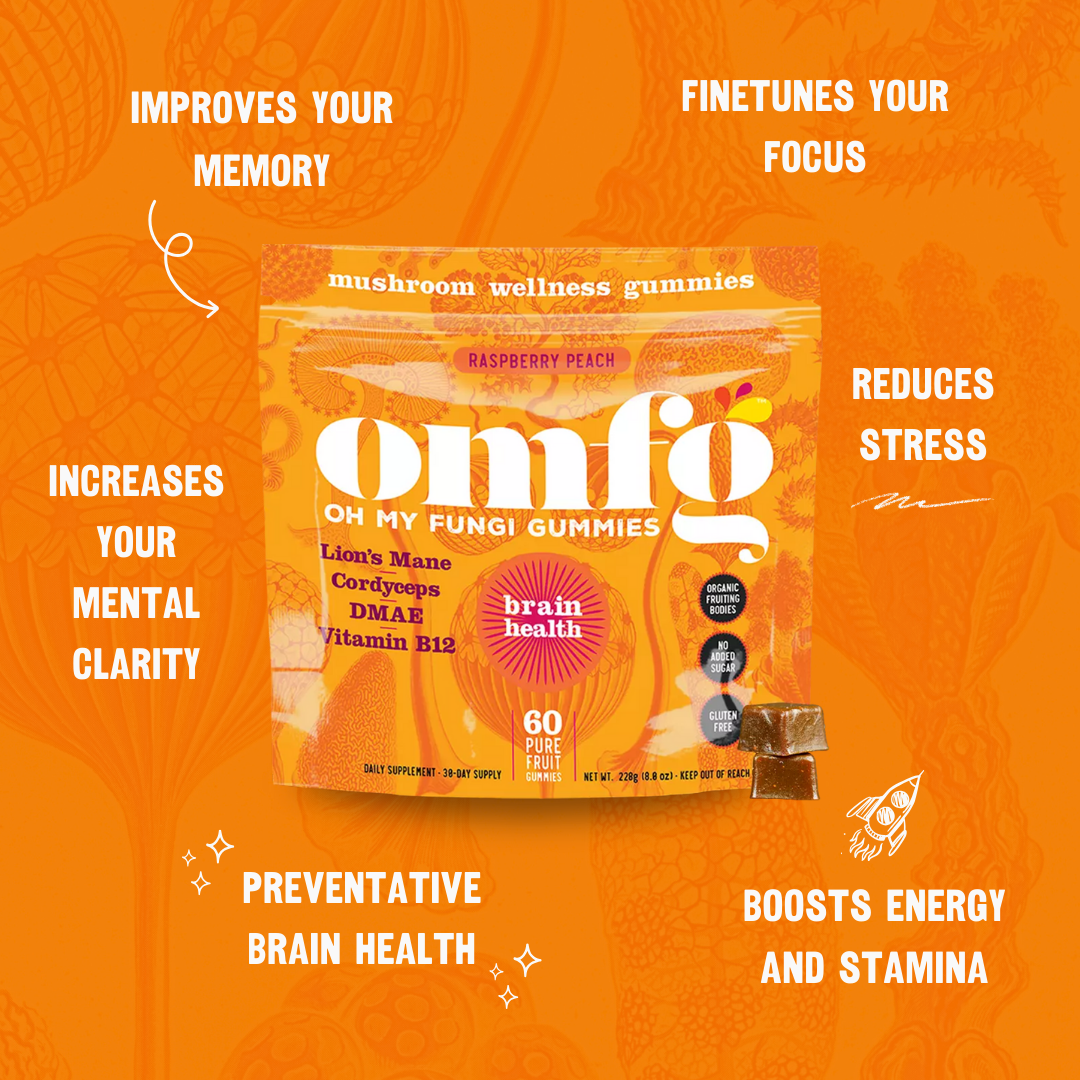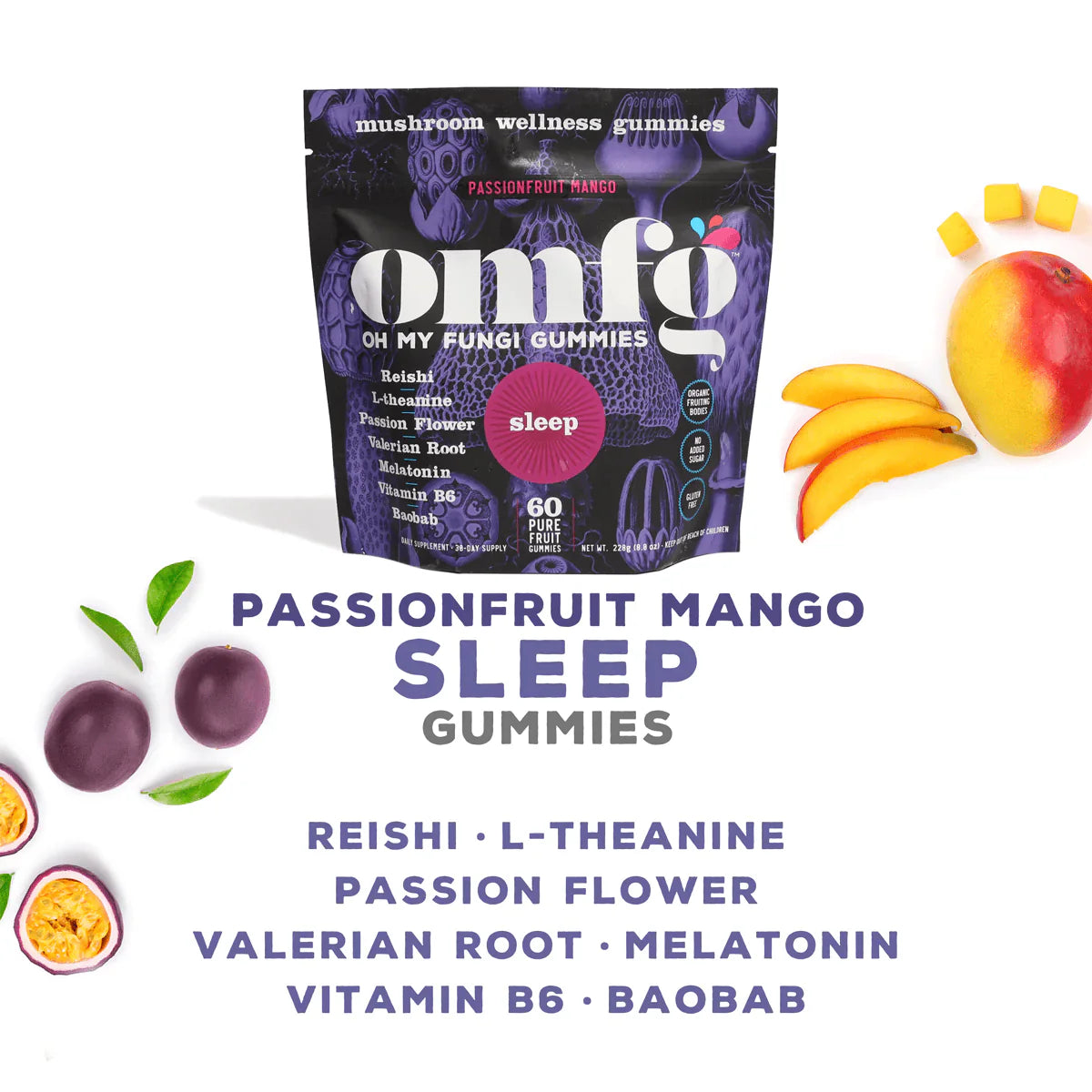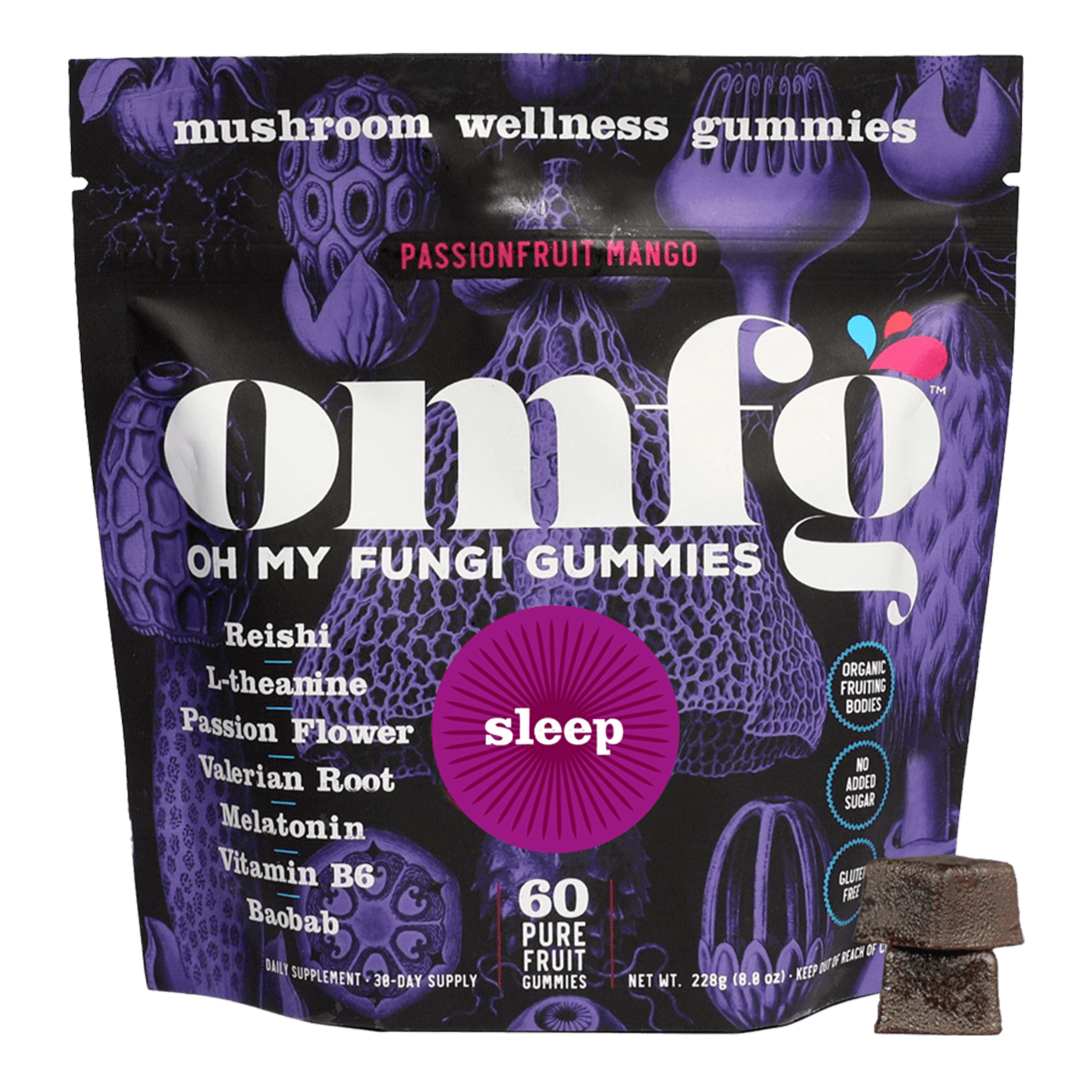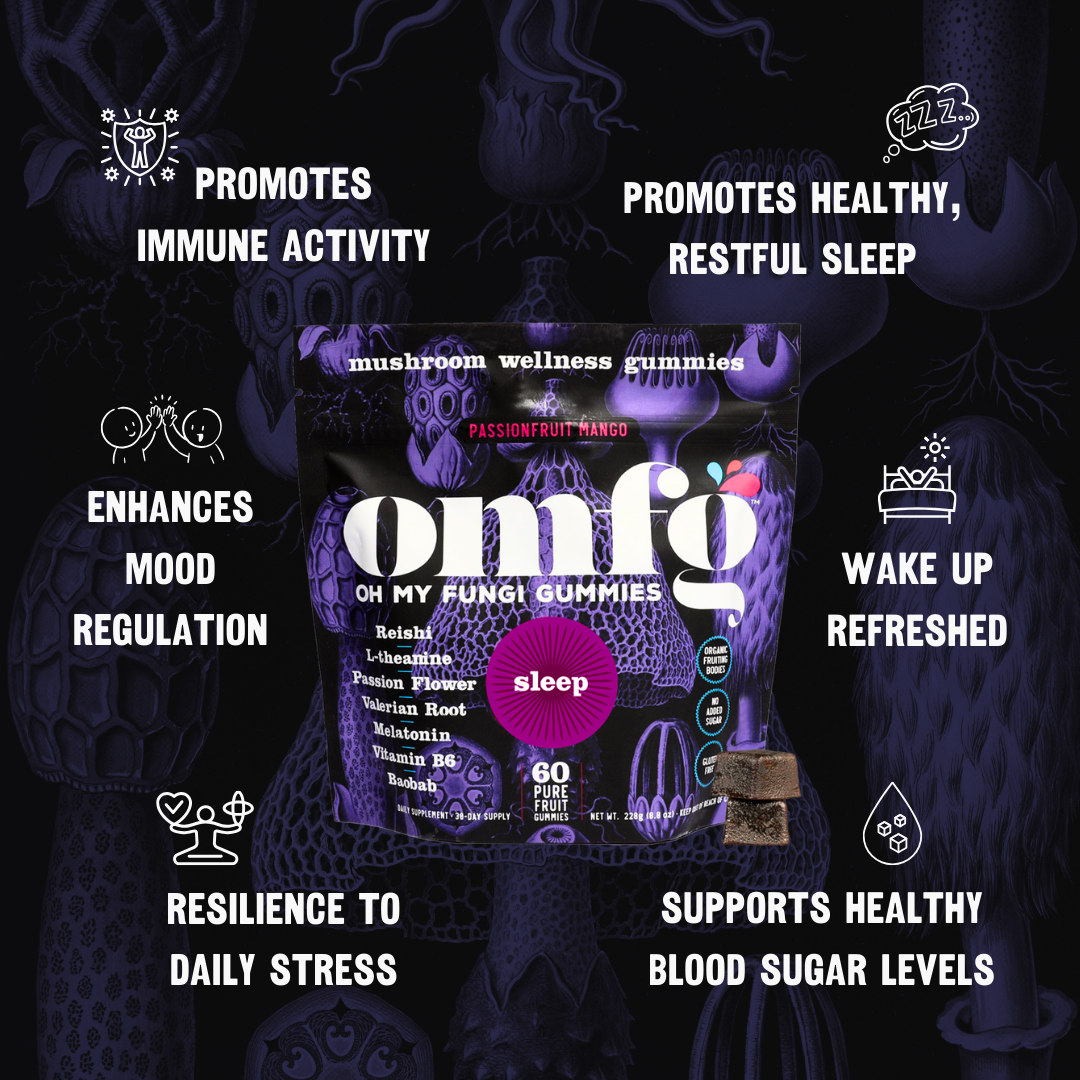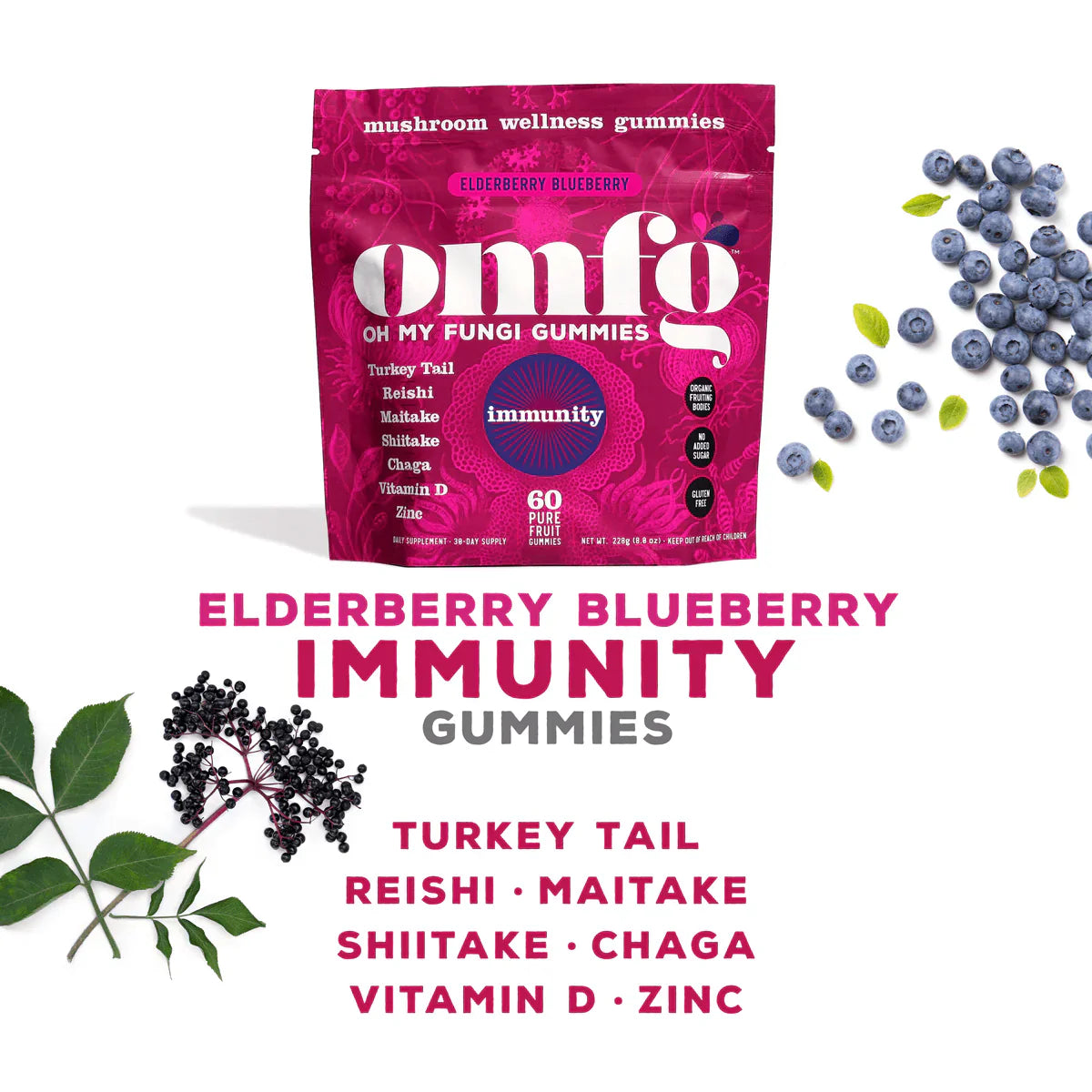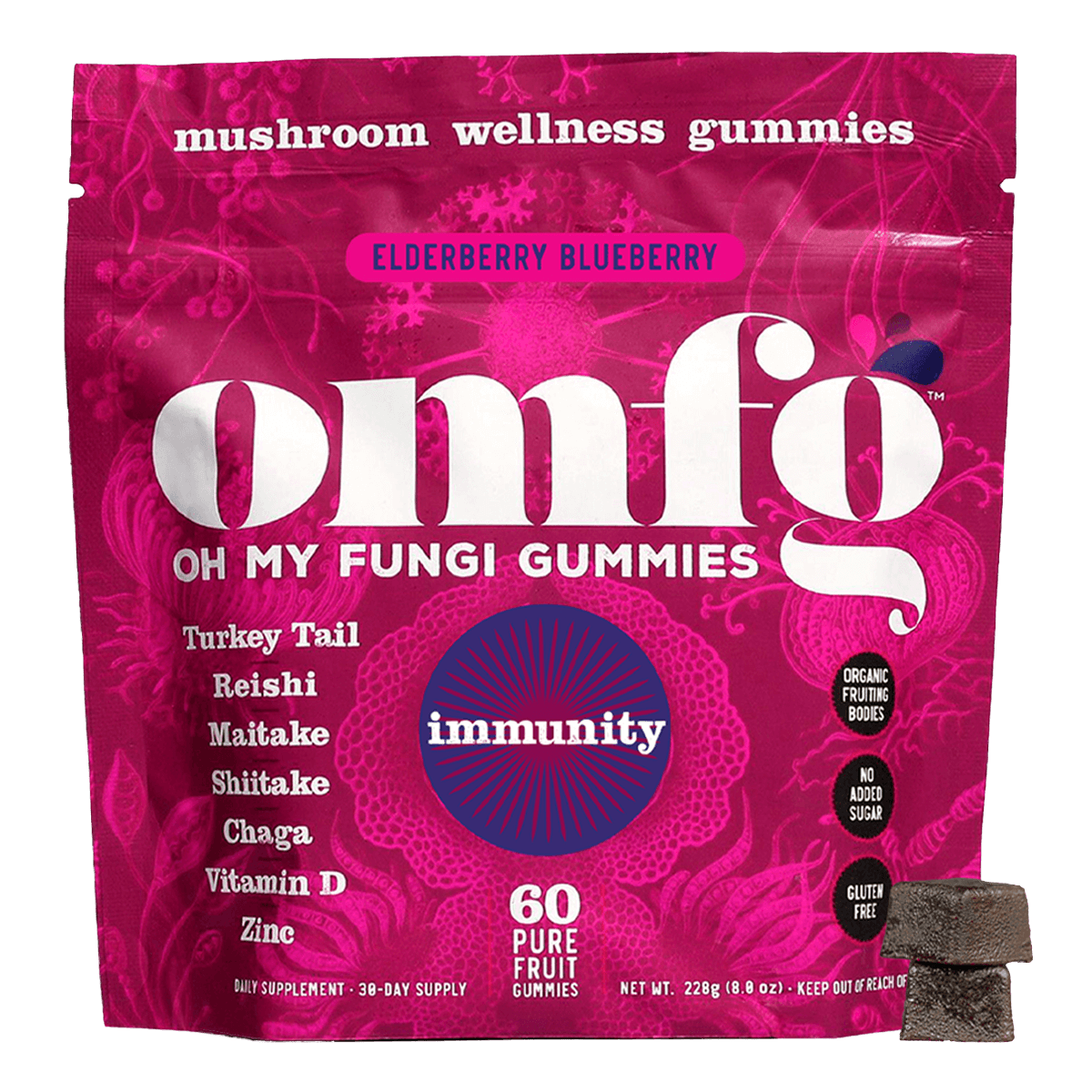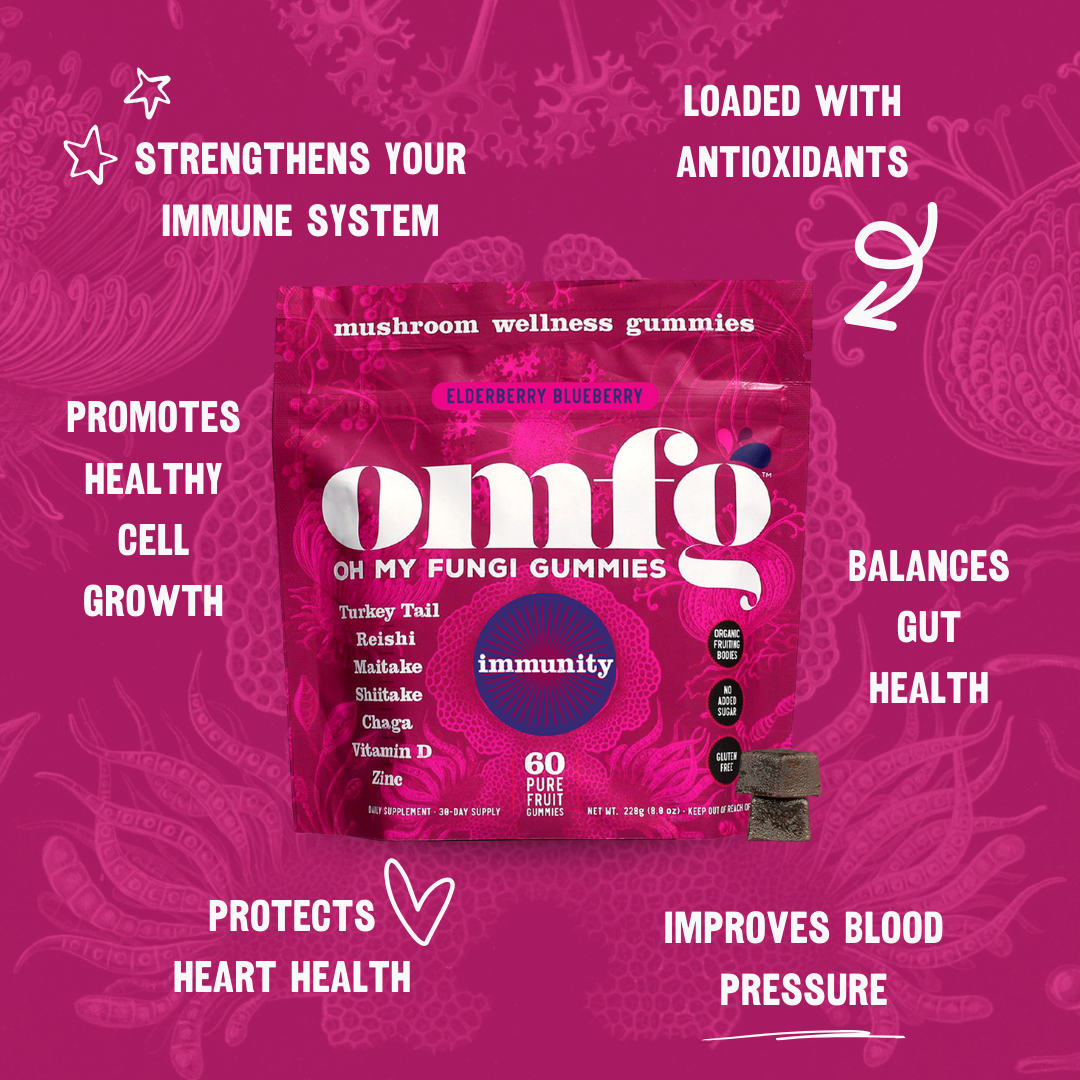5 fun facts about Turkey Tail mushrooms (Trametes Versicolor)

- They grow on every continent except Antarctica
- Their use in Chinese medicine dates back to 3000 BC
- Japan has approved an isolate from Turkey Tail for use in cancer treatment
- Studies show Turkey Tail may help support gut health
- They grow on over 70 species of trees in the U.S. alone
Turkey Tail can be found in OMFG Immunity mushroom gummies.
True to their name, Turkey Tail fungus fans out in multi-colored hues from the wood on which it grows and has a distinct resemblance to the plumage of a turkey trying to impress a mate. Fun fact: calling Turkey Tail a mushroom is somewhat of a misnomer as it lacks an actual fruiting body ‘cap.’ Instead, it’s known as a ‘bracket fungus’—a shelf-like form of fungus that juts out from the mature trees that it will ultimately help break down. It grows mostly on dead or dying trees and reproduces through spores that line its underside.1
It’s not considered much of an edible delicacy, such as shiitake or maitake, but its healing properties more than make up for it.
‘Nobody else makes Turkey Tail taste so good! All natural and exquisite’
- Julie P.
Turkey Tail mushrooms have been the subject of many scientific and medical studies, both in animals and humans, and the findings are quite remarkable.
History of Turkey Tail Mushrooms
Let’s first back up a few millennia: Reputed to have a broad spectrum of healing applications, their use as a medicinal mushroom dates back to 3000 BCE in ancient China2. With their extremely high antioxidant content (one research study discovered over 35 distinct phenolic compounds)3, it’s no wonder they have piqued the interest of both the traditional medicine community and the medical science community.
Benefits of Turkey Tail Mushrooms
Turkey Tail mushroom benefits include anti-microbial, cardio-protective, anti-diabetic, liver-protective, gut-health boosting properties, as well as what might be their most rockstar property — the way that they go after several types of cancer cells and are already in use as an adjunct cancer treatment in some countries. 2,4,5,6,7
“With their extremely high antioxidant content, it is no wonder [Turkey Tail] has piqued the interest of both the Traditional medicine community and the medical science community. ”
All the functional mushrooms we use are chock full of immune boosting compounds called beta glucans. Two of these superheroes that are distinctive to Turkey Tail mushrooms have long scientific names so we will refer to them in their well-known shorthand: PSP and PSK. Both of these have significant health-promoting qualities; they stimulate production of the good immune cells and stomp out some of the bad actor cells.

Turkey Tail Mushrooms & Cancer
In test-tube studies, PSP increases monocytes — white blood cells that combat infection and enhance immunity. It has the potential to activate natural killer (NK) cells that control several types of tumors and microbial infections by limiting their spread and subsequent tissue damage.8 The clinical data has led to its widespread adoption as an adjunct cancer therapy in Japan and China.2,5,8 Not only does it catalyze an immune response and help control aberrant cells that could develop into cancer, it actually enhances the effects of many mainstream chemotherapeutic drugs. Yes, you read that right—turkey tail mushroom is literally a complementary medicine to traditional cancer treatments.
Improve Immunity with Turkey Tail
PSK, the other stand-out beta-glucan that is specific to Turkey Tail fungus, promotes the immune response and shields the organism from toxins with NK cell activation as well as by mobilizing an army of elite-force white blood cells called macrophages that pac-man the hell out of hazardous microbes. 9, 10
“Not only does it catalyze an immune response and help control aberrant cells that could develop into cancer, it actually enhances the effects of many mainstream chemotherapeutic agents*.”
A little side note: It has been a source of frustration to the mycophiles who are true believers in the healing benefits of functional mushrooms that there are not more human clinical trials to prove these properties to the satisfaction of the medical community. There are literally hundreds of scientific studies on mice, rats, and human tissue samples in vitro, and the findings are enough to make us want to help make this mushroom medicine available to the world. Fortunately, the federal government does let us sell our mushroom products, but we just have to put disclaimers and use special language. But in the case of Turkey Tail mushrooms and its specialized compounds, there actually have been a lot of human in vivo clinical trials.2 Because of these trials, PSP and PSK have both been in use as part of standardized cancer treatment in conjunction with traditional chemo and immunotherapy drugs since the 70’s in Japan and the 80’s in China.4,5 With a little luck (and more in vivo studies), the U.S. will follow suit in the near future.

The list of potential healing applications and benefits of Turkey Tail mushrooms is far too vast for one blog post but you can see more findings in the links below that illustrate how it may be helpful for:
Turkey Tail May be helpful for:
- Supporting the microbiome, especially in people who are compromised with IBD’s (Inflammatory Bowel Diseases),11,12
- Combating HPV (Human Papillomavirus)13
- Protecting the liver14
- Improving insulin resistance 6, 15
- Depressing tumor activity in many different cancers including colorectal, gastric, breast, liver, pancreatic, and lung cancer 5, 15, 16, 17, 18,

Do Turkey Tail Mushrooms Cause Side Effects?
As far as notable side effects of ingesting Turkey Tail mushrooms, they are mercifully few and very rarely reported. Even in large doses, adverse effects are said to be minor and there is no documented evidence of liver damage from their use. Of course, people with mold or fungus allergies should probably check with their doctor first, and people with sensitive digestive systems should tread cautiously and start with low doses.20
Turkey Tail organic fruiting body extract can be found in our Immunity gummies.
"This was one of the ‘a-ha’ moments for us in determining the path we wanted to walk in working with these powerful myco-medicinals"
We would like to close this blog post with a snippet of a compelling Ted Talk from one of thegurus of modern mycology, Paul Stamets, as he discusses his own emotional journey of dealing with his mother’s stage IV breast-cancer diagnosis and subsequent experience with Turkey Tail treatment. This was one of the ‘a-ha’ moments for us in determining the path we wanted to walk in working with these powerful myco-medicinals and creating them into tasty mushroom supplement treats that go down nice and easy.
https://www.youtube.com/watch?v=mWT09ZDqFlE
SOURCES
1. https://baynature.org/2013/11/28/can-tell-true-turkey-tail-imposter/
2. https://www.ncbi.nlm.nih.gov/pmc/articles/PMC4684115/
3. https://www.ncbi.nlm.nih.gov/pmc/articles/PMC6010034/
4. https://www.ncbi.nlm.nih.gov/books/NBK401261/
5. https://www.ncbi.nlm.nih.gov/pmc/articles/PMC6044372/(cancer therapies)
6. https://pubmed.ncbi.nlm.nih.gov/29243310/
7. https://www.medicalnewstoday.com/articles/turkey-tail-mushroom
8. https://www.ncbi.nlm.nih.gov/pmc/articles/PMC5592279/
9. https://www.ncbi.nlm.nih.gov/pmc/articles/PMC3206987/
10. https://pubmed.ncbi.nlm.nih.gov/22204346/
11. https://pubmed.ncbi.nlm.nih.gov/25006989/
12. https://pubmed.ncbi.nlm.nih.gov/23435630/
13. https://pubmed.ncbi.nlm.nih.gov/25271984/
14. https://onlinelibrary.wiley.com/doi/abs/10.1002/mnfr.201801231
15. https://pubmed.ncbi.nlm.nih.gov/22204346/
16. https://www.ncbi.nlm.nih.gov/pmc/articles/PMC6367522/
17. https://pubmed.ncbi.nlm.nih.gov/19087769/
18. https://pubmed.ncbi.nlm.nih.gov/22701186/
19. https://www.macalester.edu/ordway/biodiversity/inventory/turkeytailfungus/
20. https://healthbymushrooms.com/turkey-tail-mushroom-side-effects/

